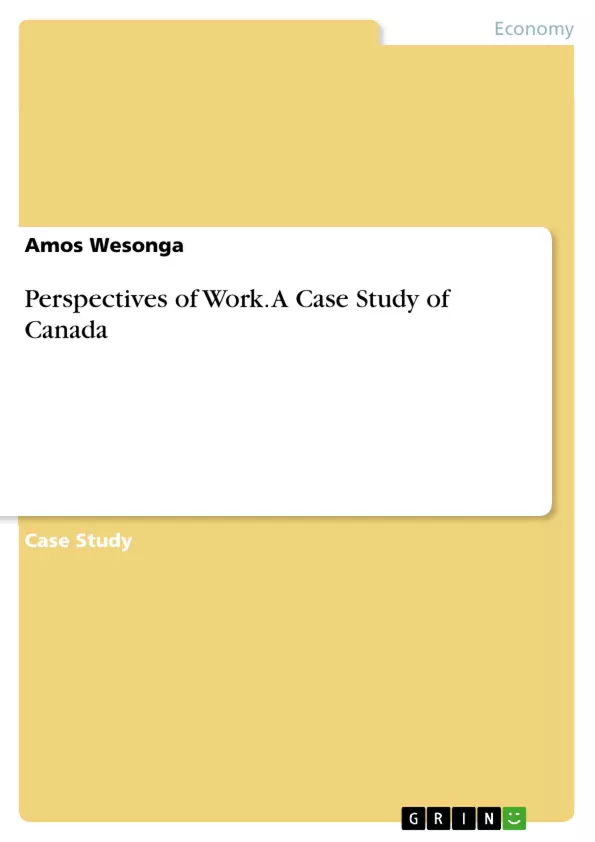Work refers to the activities undertaken involving the application of physical or mental effort. The motivation behind work is often rewarded and in many instances is in the form of money. The purposes for which work and the duties therein are undertaken are varied from one person to another or one geographical location to another. The drive to fully comprehend the purpose for which work is conducted leads to the inception of perspectives of action which as discussed above include curse, freedom, commodity, occupational citizenship, dis-utility, personal satisfaction, social relations, care for others identity and service. The paper establishes the motive behind work concerning freedom, professional citizenship, and assistance with the critical focus on the Canadian human resource sector. Further, the article determines that understanding the various perspectives of work is very important to facilitate the smooth running of individual lives (with a purpose), institutions (for efficiency and productivity) as well as the country as the whole.
Inhaltsverzeichnis (Table of Contents)
- Introduction
- The Freedom Perspective
- Political Liberalism (Lockean Property Rights)
- Economic Liberalism (Freedom to Contract)
- Occupational Citizenship Perspective
- Work as Service
- Service to God
- Household Service
- Service to the Nation
- Military and Economical Service
- Implications
- Human Resource Practice
- Public Policy
- Judicial and Legal importance
- The utility of economic resources
Zielsetzung und Themenschwerpunkte (Objectives and Key Themes)
The aim of this paper is to understand the motives behind work, particularly focusing on the perspectives of freedom, occupational citizenship, and service. The paper examines these perspectives within the context of Canada, analyzing their implications for human resource practices, public policy, legal interpretations, and the utilization of economic resources.
- Perspectives of work and their motivations
- The role of freedom in shaping work perspectives
- Occupational citizenship as a driver of work motivation
- Work as service and its various forms
- Implications of work perspectives for human resource management and public policy
Zusammenfassung der Kapitel (Chapter Summaries)
- Introduction: This chapter defines work and introduces the different perspectives on work, including freedom, occupational citizenship, disutility, and service. The paper focuses on examining the perspectives of freedom, occupational citizenship, and facility in Canada.
- The Freedom Perspective: This chapter explores the concept of freedom as it relates to work. It discusses two main aspects of freedom: political liberalism, which emphasizes individual rights and property ownership, and economic liberalism, which focuses on economic liberty and the accumulation of wealth.
- Occupational Citizenship Perspective: This chapter examines the perspective of work as a form of citizenship, where individuals find fulfillment and belonging through their participation in society. It highlights the importance of working rights and the humanization of labor.
- Work as Service: This chapter explores different forms of service-oriented work, such as service to God, household service, service to the nation, and military and economical service. It examines the motivations behind each type of service and its impact on individuals and society.
- Implications: This chapter discusses the practical implications of understanding different work perspectives for organizations, human resource professionals, and society as a whole. It highlights the importance of considering these perspectives when formulating policies, designing work structures, and managing employees.
- Human Resource Practice: This chapter explores how the study of work perspectives can inform human resource practices, such as employee training, motivation, and talent management. It emphasizes the importance of understanding employee motivations and aligning them with organizational goals.
- Public Policy: This chapter examines the role of public policy in shaping work perspectives and ensuring fair treatment of workers. It discusses the importance of protecting employee rights, ensuring fair compensation, and fostering a positive work environment.
- Judicial and Legal importance: This chapter emphasizes the need for a legal framework to address disputes arising from employment contracts and ensure fair treatment of employees. It highlights the importance of understanding the legal implications of different work perspectives and using legal tools to resolve conflicts.
Schlüsselwörter (Keywords)
This paper focuses on the various perspectives of work, including freedom, occupational citizenship, and service. It examines the motivations behind these perspectives, their implications for human resource practices, public policy, and the legal environment in Canada. The paper also considers the importance of understanding employee behavior and motivations, as well as the role of economic resources in shaping work structures and practices.
What are the different perspectives of work discussed?
The paper explores work as freedom, occupational citizenship, commodity, service, and personal satisfaction, with a focus on Canada.
What does the "Freedom Perspective" in work entail?
It refers to political liberalism (individual rights) and economic liberalism (freedom to contract and accumulate wealth).
How is work defined as "Service"?
Work as service can be directed towards God, the household, the nation, or take the form of military and economic service.
Why is understanding work perspectives important for HR?
It helps in training, motivating, and managing employees by aligning their individual motivations with organizational goals.
What is the "Occupational Citizenship" perspective?
This perspective views work as a way for individuals to participate in society, emphasizing rights and the humanization of labor.



